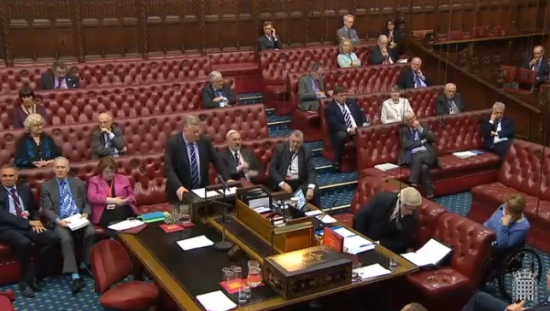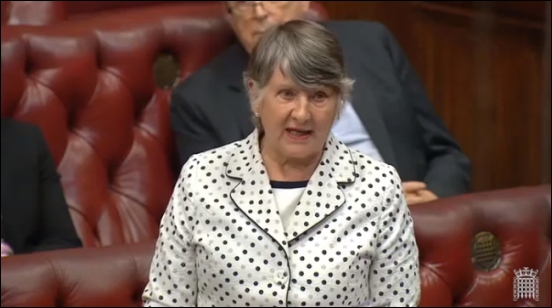The work of children at a Burnham-On-Sea school has been featured in a House Of Lords debate this week that may lead to a change in the laws over junk food TV advertising.
Thirty Year 4 students at St Jospeh’s School in Burnham sent their project work on the issue to Baroness Walmsley, and she was so impressed that she referred to it during a Lords debate about reducing child obesity and junk food advertising.
English teacher Louise Orledge told Burnham-On-Sea.com: “The children have been working on a project on healthy eating and junk food advertising, with the goal of writing a letter on the matter to push for change and help reduce obesity rates.”
“We wrote to Baroness Walmsley, who has been working on this subject, and were delighted when she contacted us to say that she would be holding a debate in the House of Lords on the subject and would like to mention the children’s work.”
“The children were so excited to hear that their work has been mentioned in this way and that it could lead to real change in the laws on junk food advertising.”
She added: “We did a survey and found that all the children had seen junk food advertising, including during children’s shows, Saturday evening programmes, while none had seen the ‘Change For Life’ ads that promote healthy eating.”
During the House Of Lords debate, Baroness Walmsley, pictured, said: “My Lords, we have a childhood obesity epidemic in this country, with disadvantaged children significantly more likely to be affected. Nearly one in four children is overweight or obese in their first year of primary school, rising to more than one in three by the time they leave. Overweight children are more likely to become overweight adults, leading to heart disease, cancer, diabetes and stroke. Issues related to diabetes are a strain on the economy and on the NHS, so we need to address this at the earliest possible opportunity, while people are young—hence this debate.”
“Out of the mouths of babes and sucklings come truth and wisdom, so I thought that perhaps we should hear from the children themselves. It so happens that I recently received 30 letters from children at St Joseph’s Catholic Primary School in Burnham-On-Sea. These eight and nine year-olds are very aware of the dangers of obesity, such as heart disease and diabetes—although they did not mention cancer, even though 5% of cancers are thought to have a dietary link. They are not alone, since 85% of the population is also unaware of that link.?
The children have been looking into the advertising of junk food on TV and wrote to ask me to do something about it. They said that 23 children out of their class of 30 had seen more junk food adverts than healthy food adverts.”
“Here is what William had to say: “As everyone knows fat is bad for you and surely our kids are being poisoned by too much. Firstly we should get good foods on our plates. Secondly we need to get bad foods off our plates. Thirdly fatty foods can block your arteries. I would draw your attention to the fact that 28 out of 30 children said adverts make us want to buy garbage. Therefore we must not let unwholesome adverts on TV every day, just on Mondays and Saturdays and moreover we must show more Fit4Life adverts. My evidence to support this is only 10 out of 30 kids have seen Fit4Life adverts which is not good. In summary we must stop this advertising problem. My final point is that you are responsible”.”
“George agreed, but he let out a little secret: “Isn’t it the case that people like the taste of fat and if you keep eating junk you will get heart disease? Some eat a midnight snack under the bed, not often but it is probably junk food”.

“Jared was concerned about the NHS. He said: “Surely we can help the NHS. They are having too many customers”. He must have read the 2016 report from the Food Foundation, which claimed that the current diet-driven crisis is crippling the NHS. The report said that NHS costs associated with being overweight or obese are £6.1 billion every year and £27 billion for the wider economy.
“Ryan thinks you should have a balanced diet. He said: “My view is balance. Get rid of some junk food but not all junk food because some people like it, including me”.
“The new soft drinks industry levy, commonly known as the sugar tax, came into force recently, and that is a very good thing—although the children are not fooled. They have noticed that it is limited to sugary drinks. For example, Brac said: “I would draw your attention to hidden sugars which are found in cereal, yoghurt, bread, smoothies and pizza”. No fool, Brac.
“So, on the children’s behalf, can I ask the Minister whether the Government plan to do anything about all the other hidden sugars in our food? I must say it is very heartening to hear that so many popular drinks have been reformulated, although I am sure they would not have done it without the levy. So it is important to monitor the effects of the sugar tax, and I hope the Minister will say how they intend to do that. Will he also tell us where the money is to be spent and whether local authorities, which now have the responsibility for public health, will have a say in the matter?”
“The Advertising Standards Authority’s Committee of Advertising Practice is about to carry out a review of whether the rules on advertising junk food during children’s TV programmes and on non-broadcast media are right. The children and I think the rules need changing, so I hope the reviewers will take notice of their opinion.”
“For example, Emma said: “In my opinion adverts about junk food are taking over and I can’t help noticing that they mostly do it when children are around. Clearly people are falling for things like, if you eat these delicious golden chicken nuggets it will make you happy and if you drink this Cola, you and your brother will get along forever”.
“But Lillia was not taken in. She said: “Bad food makes you fat and ill and in the end you just die”. Manley agreed. He said: “Don’t eat junk. It could give you a very bad tummy ache”. Joshua had a solution. He said: “Isn’t it clear preventable diseases aren’t being prevented? It’s not hard to prevent them yet we don’t. It’s quite sad don’t you think?”. He wants cheaper fruit and vegetables. The Food Foundation agrees. It recommends: “Subsidies that favour healthy food over unhealthy food”.
“The ASA said in its briefing to us at half past two this afternoon: “Currently, the evidence shows that advertising has only a modest effect on children’s food preferences and that there are multiple and complex factors, beyond advertising, that are instrumental in childhood obesity.”
“The causes are indeed complex but the children of St Joseph’s and many other experts do not agree that advertising has only a modest effect on children’s food preferences. Their letters refer to the large number of junk food adverts on TV programmes—in “family time”, not just children’s programmes—but they do agree that there are other factors. Holly says: “Surely the Government can make a law saying there should be a limit of junk food adverts”.
“But she realises that it is not just about what you eat; keeping fit is also part of the solution, and it is fun. Tommy agreed. He wants more PE lessons. Finbar described children’s sedentary lifestyles. He said: “It seems to me that people are starting to get more lazier by the day. As I see it people finish school or work, go home then walk to their TV or games console. And might even have their dinner there”.
“Ukactive, chaired by our noble friend Lady Grey-Thompson, promotes physical activity for children. It told me that half of all seven year-olds are failing to achieve the recommended 60 minutes of physical activity per day. NHS research in 2015 found that one in five children did no sport or physical activity at school. It would help schools to plan if the Government were clearer about their long-term plans for the primary PE and sport premium. This might be the responsibility of the Department for Education, but could the Minister from the health department enlighten us? As Finbar said, physical inactivity is a major cause of childhood obesity.”
“The children want to know what we are going to do about it. Cancer Research UK proposes a 9 pm watershed on TV advertising of junk food. This does not require legislation; Ofcom could be instructed to act. Will the Minister comment on that? It is a decade since Ofcom’s restrictions came into effect, and in that time viewing habits have drastically changed. Evening and family programmes, shown between 7 pm and 9 pm, are now most frequently watched by children and young people, yet they are not covered by existing regulations unless the advertisement is directly aimed at children. It seems that current rules are no longer fit for purpose. The Obesity Health Alliance found that more than half of food and drink adverts shown during family viewing would be banned on children’s TV under current rules.”
“Your Lordships might wonder whether there is any evidence that restricting the marketing of junk food could help in the fight against childhood obesity. Well, I have good news. There is evidence from Quebec that ?a ban on advertising junk food to children can work. Its strict rules since 1980 have resulted in a much lower level of child obesity there than in any other part of Canada. Will the Minister look at this evidence and act on it? Given that Public Health England advised the Government to include further advertising restrictions in the 2016 child obesity plan, perhaps the Minister will explain why the Government did not take its advice. Could he now tell the House whether they have seen the error of their ways? If so, I will be delighted to tell the children of St Joseph’s”







